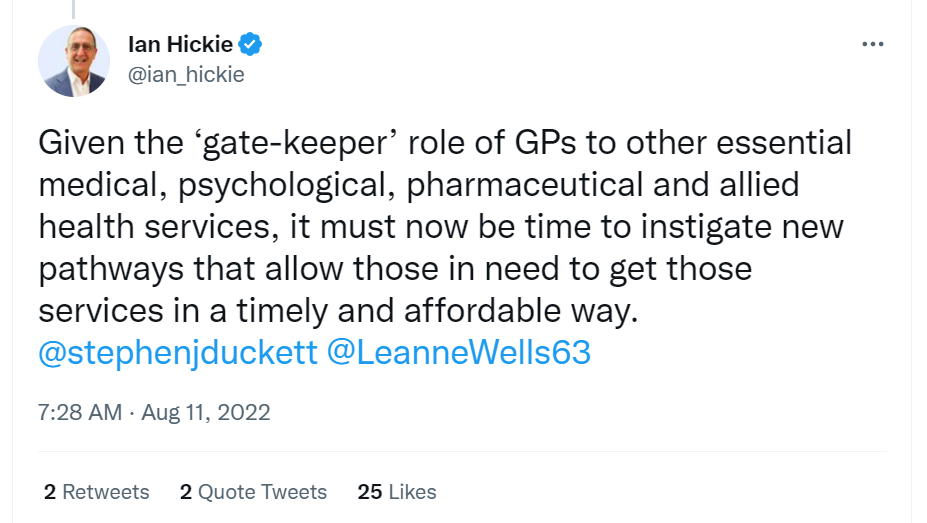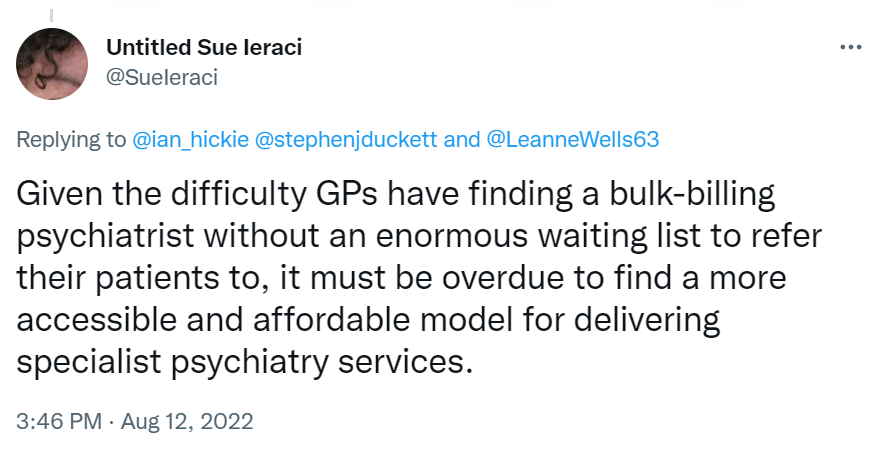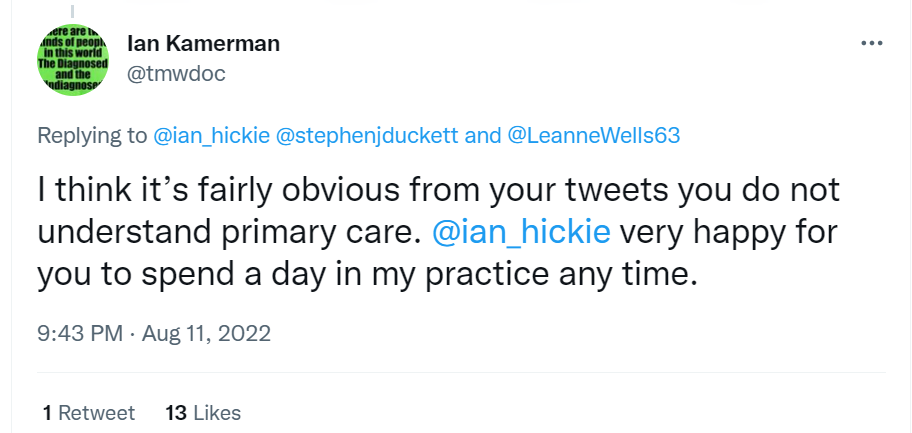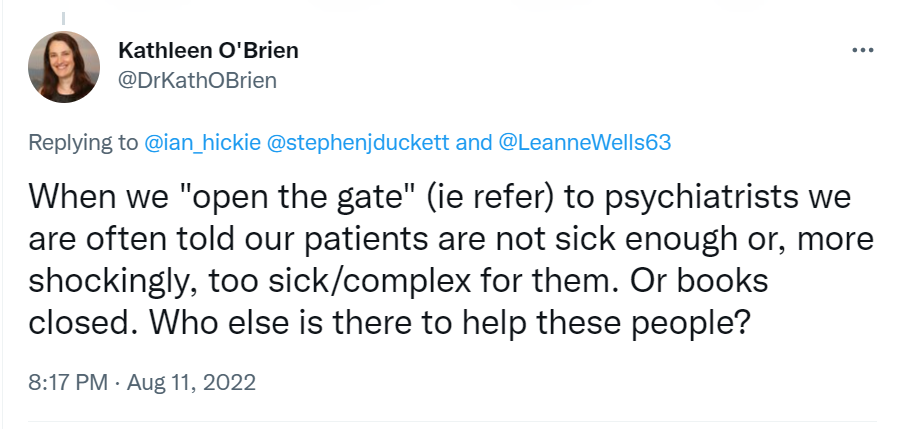I AM not ashamed to say that huge swathes of 2022 have completely baffled me.
Welcome to the last issue of InSight+ for the year, by the way. We’ve had a cracking year, with our readership growing by about 40% on 2021 by user numbers, and our articles being clicked on just shy of 895 000 times in 2022.
Perhaps our readers have found 2022 baffling as well, and you’ve been looking for answers.
Two issues stand out to me as being the big-ticket items.
First is the backlash against GPs. That seemed to come initially from other specialists, most notably psychiatrists.

GPs and their allies came out swinging. On Twitter:



… and in InSight+, where Associate Professor Louise Stone (here, here, here and here) made the case for the complexity of general practice and its vital role filling the gaps in mental health care. Dr Jillann Farmer also weighed in, writing:
“GPs are the least likely to have large gap payments, but the most likely to be under-remunerated by Medicare for their work. We need to take a long, hard look at why a GP spending 40 + minutes on assessing and designing a management plan for a patient under a Mental Health Care Plan has a scheduled fee of $141.00 ($3.33 per minute for 45 minutes, or 35 minutes, just $96.25), and a psychiatrist undertaking an item 291 assessment and management plan of over 45 minutes has a scheduled fee of $485.70 ($10.79 per minute), almost 3.5 times the GP fee.”
Then came the so-called Medicare rorts scandal, as concocted a piece of weirdness as I’ve seen in a long time. The ABC’s 7.30 report went in hard (here, here, here, here and here) on a thesis by Dr Margaret Faux which, to this day, I’m not convinced said what they thought it said. Here’s Dr Eddie Cliff and Dr Tori Berquist’s excellent analysis.
So, why the backlash against GPs?
I’ve heard different theories: GPs were high on the public’s love list during the worst of the COVID-19 pandemic, so the media felt the need to cut them down (tall poppy syndrome); possible vested interests of those doing the criticising; and the timing of the Medicare rorts scandal being a distraction before the Albanese government’s first budget in mid-to-late October.
But for me the biggest source of bafflement this year has been the politicians’ and, sadly, some public health officials’ continuing denialism around SARS-CoV-2 and COVID-19.
From the moment the federal election campaign started in April until quite some time after Labor’s win on 21 May, the parties went silent on the topic. Since then, it’s been a constant campaign of “living with”, “COVID is not exceptional”, “personal responsibility” and minimisation of protections. Meanwhile, over 100 000 cases were reported last week alone, an average of 14 346 cases a day – an underestimate given how hard it is to get a polymerase chain reaction (PCR) test, and how the accuracy of rapid antigen tests (RATs) waning.
Nobody on the government side of things seems to want to talk about the costs of long COVID with its increased risks of other health consequences, or the dangers of reinfection, despite the Inquiry into Long COVID and Repeated COVID Infections. Never mind the 16 244 confirmed cases of death by COVID-19 in Australia since 1 March 2020, 13 987 of which have happened since 1 January 2022.
I was lucky enough in my travels a few weeks ago to run into a member of the Australian Technical Advisory Group on Immunisation (ATAGI). They told me, off the record, that ATAGI was likely to change its recommendations about booster shots early in 2023. The new advice would be “agnostic” about the number of vaccines, so if you have not had one within a yet-to-be-specified timeframe (3 months? 6 months?) you will be eligible for a booster.
My question was, why not do that now. The answer was because ATAGI wants to “keep its powder dry” leading into winter 2023. Is that a supply concern, I asked. No, but with lessening effectiveness of each booster against the latest variants, ATAGI don’t want us getting our shots too soon, apparently.
Make of that what you will. Fingers crossed a better vaccine comes along.
In the meantime, some thankyous!
To you, gentle reader, for continuing to engage with InSight+ and holding us to account, thank you.
To our regular columnists – Dr Jillann Farmer, Dr Lilon Bandler, Dr Alisha Dorrigan, Dr Will Cairns, Associate Professor Louise Stone – thank you.
To op-ed writers across the country who have answered the commissioning call readily and enthusiastically, thank you. And to those who send us their articles completely unprompted, thank you.
To the editing team at the MJA for all the work they do every week on InSight+, thank you.
To Caitlin Wright and Sarah Colyer, my trusty journalists through 2022, thank you, thank you, thank you.
Here are the top 10 InSight+ articles for 2022:
- Every adult should consider switch to potassium-enriched salt, by Professor Bruce Neal;
- Accessibility, cost of game-changing obesity drugs problematic, by Sarah Colyer;
- More proof COVID is a multi-system cluster bomb, by Cate Swannell;
- AMA Victoria to call for Royal Commission into AHPRA, by Cate Swannell;
- Are doctors really the parasites of the healthcare system?, by A/Professor Louise Stone;
- Ozempic shortage: don’t blame it on the socials, by Caitlin Wright;
- Medicare rorts? We read Dr Faux’s thesis so you don’t have to, by Dr Eddie Cliff and Dr Tori Berquist;
- SCAD: challenging, under-recognised form of heart attack, by Dr Barbara Murphy and colleagues;
- Walking the prostate cancer tightrope, by Cate Swannell; and
- Fallout continues from Ahpra “over-reach”, by Cate Swannell.
InSight+ will be back with its first issue of 2023 on 23 January. Until then, have a great summer, celebrating whichever holidays are important to you and your family.
Cate Swannell is a journalist and editor with 34 years’ experience, 10 of them in the field of medical journalism. She has been the editor of InSight+ since 2015.
The statements or opinions expressed in this article reflect the views of the authors and do not necessarily represent the official policy of the AMA, the MJA or InSight+ unless so stated.
Subscribe to the free InSight+ weekly newsletter here. It is available to all readers, not just registered medical practitioners.
If you would like to submit an article for consideration, send a Word version to mjainsight-editor@ampco.com.au.

 more_vert
more_vert
Thank you for your insights. We mostly work alone and I do not discuss politics with colleagues. My family and friends just dont believe me, when I mention what is happening . So it is SO helpful to feel validated and know that other doctors are equally bemused by a year where GP’s have been attacked from all sides. I have felt lifted by each of the above articles. No one in power really gets primary health care, nobody understands how we do our job and no one understand our frustration with COVID and NSW health. At least we have our patients, who mostly get it. ( I think)